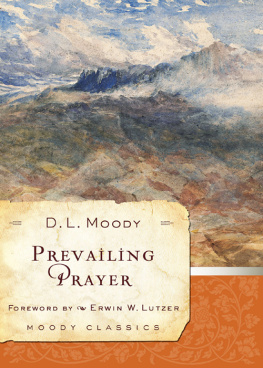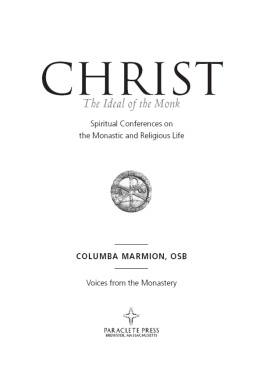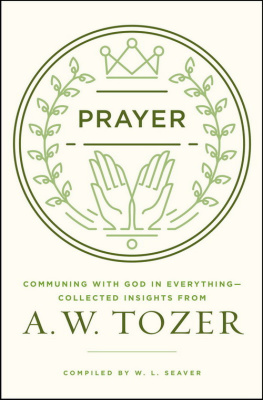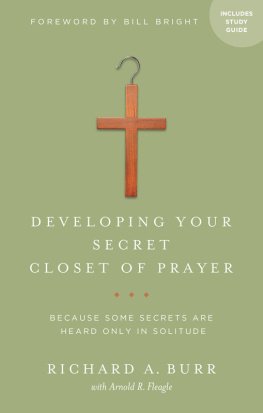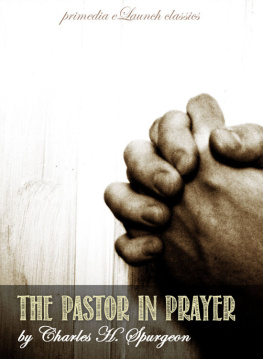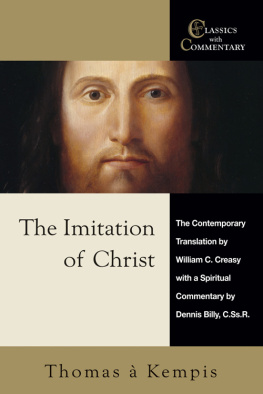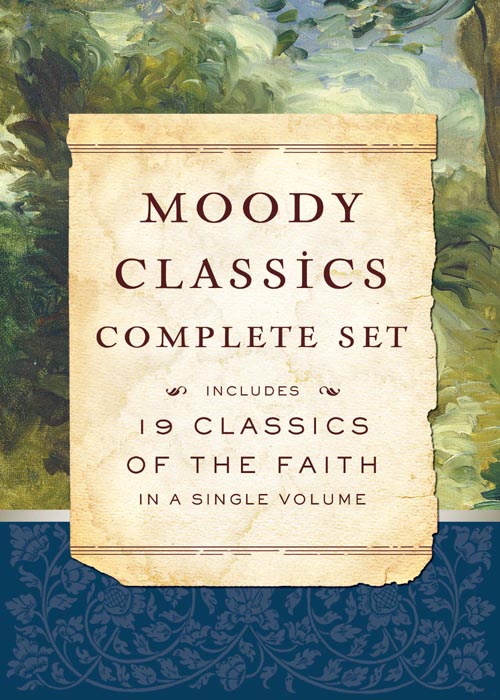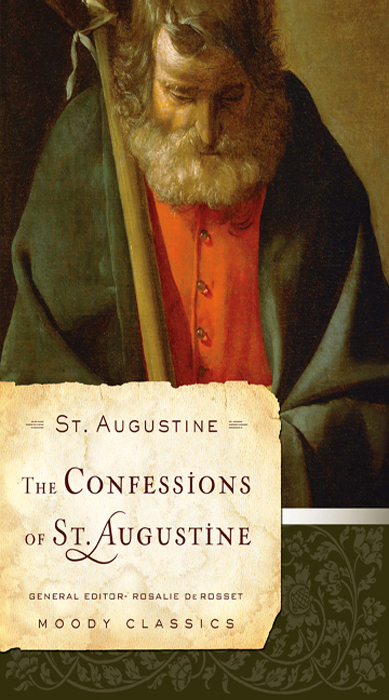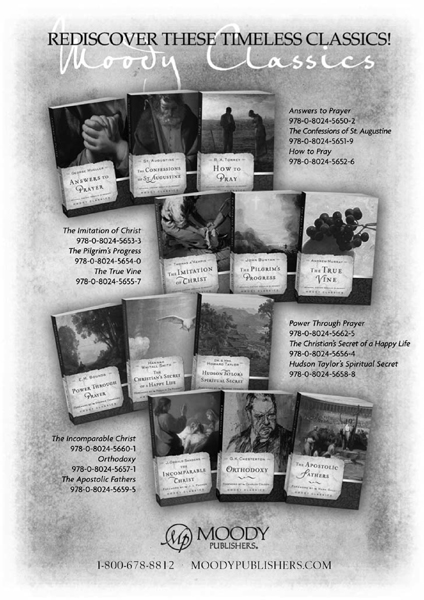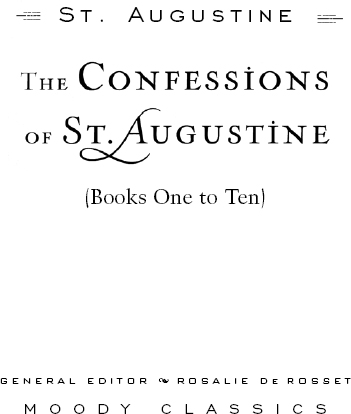Dr. Paul Bechtel edited the 1981 edition. He worked primarily with an edition translated from the Latin by E. B. Pusey (18001882), an Anglican clergyman associated with the Oxford movement of that century.
We hope you enjoy this book from Moody Publishers. Our goal is to provide high-quality, thought-provoking books and products that connect truth to your real needs and challenges. For more information on other books and products written and produced from a biblical perspective, go to www.moodypublishers.com or write to:
Augustine, Saint, Bishop of Hippo.
[Confessiones. Liber 1-10. English]
The confessions of St. Augustine. (Books one to ten) / edited by Paul M. Bechtel.
p. cm.
ISBN 978-0-8024-5651-9
1. Augustine, Saint, Bishop of Hippo. 2. Christian saintsAlgeriaHippo
(Extinct city)Biography. I. Bechtel, Paul M. II. Title.
THE FIRST BOOK
Confessions of the greatness and unsearchableness of GodOf Gods mercies in infancy and boyhood, and human willfulnessOf his own sins of idleness, abuse of his studies, and of Gods gifts up to his fifteenth year.
THE SECOND BOOK
Object of these confessionsFurther ills of idleness developed in his sixteenth yearEvils of ill society, which betrayed him into theft.
THE THIRD BOOK
His residence at Carthage from his seventeenth to his nineteenth yearSource of his disordersLove of showsAdvance in studies, and love of wisdom-Distaste for ScriptureLed astray to the ManichaeansRefutation of some of their tenetsGrief of his mother, Monnica, at his heresy, and prayers for his conversionHer vision from God, and answer through a Bishop.
THE FOURTH BOOK
Augustines life from nineteen to twenty-eightHimself a Manichaean, and seducing others to the same heresyPartial obedience amidst vanity and sin, consulting astrologers, only partially shaken hereinLoss of an early friend, who is converted by being baptized when in a swoonReflections on grief, on real and unreal friendship, and love of fameWrites on the fair and fit, yet cannot rightly, though God had given him great talents, since he entertained wrong notions of God; and so even his knowledge he applied ill.
THE FIFTH BOOK
Augustines twenty-ninth yearFaustus, a snare of Satan to man, made an instrument of deliverance to St. Augustine, by showing the ignorance of the Manichees on those things wherein they professed to have divine knowledgeAugustine gives up all thought of going further among the ManicheesIs guided to Rome and Milan, where he hears St. AmbroseLeaves the Manichees, and becomes again a Catechumen in the Catholic Church.
THE SIXTH BOOK
Arrival of Monnica at Milanher obedience to St. Ambrose, and his value for herSt. Ambroses habits-Augustines gradual abandonment of errorFinds that he has blamed the Catholic Church wronglyDesire of absolute certainty, but struck with the contrary analogy of Gods natural ProvidenceHow shaken in his worldly pursuitsGods guidance of his friend AlypiusAugustine debates with himself and his friends about their mode of lifeHis inveterate sins, and dread of judgment.
THE SEVENTH BOOK
Augustines thirty-first yearGradually extricated from his errors, but still with material conceptions of God-Much aided by an argument of NebridiusSees that the cause of sin lies in free-will, rejects the Manichaean heresy, but cannot altogether embrace the doctrine of the ChurchRecovered from the belief in Astrology, but miserably perplexed about the origin of evilIs led to find in the Platonists the seeds of the doctrine of the Divinity of the Word, but not of His humiliationHence he obtains clearer notions of Gods majesty, but, not knowing Christ to be the Mediator, remains estranged from HimAll his doubts removed by the study of Holy Scripture, especially St. Paul.
THE EIGHTH BOOK
Augustines thirty-second yearHe consults Simplicianus, from him hears the history of the conversion of Victorinus, and longs to devote himself entirely to God, but is mastered by his old habitsIs still further roused by the history of St. Anthony, and the conversion of two courtiersDuring a severe struggle, hears a voice from heaven, opens Scripture, and is converted, with his friend AlypiusHis mothers vision fulfilled.
THE NINTH BOOK
Augustine determines to devote his life to God, and to abandon his profession of Rhetoric, quietly, howeverRetires to the country to prepare himself to receive the grace of Baptism, and is baptized with Alypius, and his son AdeodatusAt Ostia, on his way to Africa, his mother, Monnica, dies, in her fifty-sixth year, the thirty-third of AugustineHer life and character.
THE TENTH BOOK
Having in the former books spoken of himself before his receiving the grace of Baptism, in this Augustine confesses what he then wasHe inquires by what faculty we can know God at all, when he enlarges on the mysterious character of the memory, wherein God, being made known, dwells, but which could not discover HimExamines his own trials under the triple division of temptation, lust of the flesh, lust of the eyes, and pride,what Christian continency prescribes as to eachOn Christ the Only Mediator, who heals and will heal all infirmities.
I NTRODUCTION
Augustines Confessions

W HO WILL GIVE ME HELP , SO THAT I MAY REST IN YOU ? W HO WILL HELP ME , SO THAT YOU WILL COME INTO MY HEART AND INEBRIATE IT TO THE END THAT I MAY FORGET MY EVILS AND EMBRACE YOU , MY ONE GOOD ?
Book 1, Chap. 5
T HAT A UGUSTINE was one of the greatest minds who has ever been in the church is a given, and his most well-known work, the Confessions, has a unique place among the worlds great classics. The line that appears in the opening paragraph of Book 1, our heart is restless, until it rest in thee, is quoted everywhere, though not everyone who quotes it or hears it knows where it came from and may even think its a biblical saying.
Many people also know that Augustine was the son of Monica, a mother who prayed faithfully and arduously for him for years, and that he was finally converted from a rebellious and promiscuous life. Sadly, however, too few mainstream Christians outside of academia or a classroom where the book is required pick up the book and read it, though its analysis of sin, both theological and psychological, is dramatic, colorful, convicting, and utterly contemporary. Unlike so many of the soft pop-culture treatments that come and go like the seasons, this work remains, for reasons that become obvious immediately. Even a casual reading of some of its parts is memorable.

